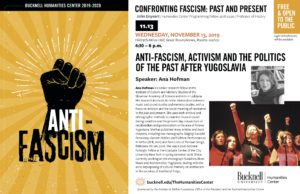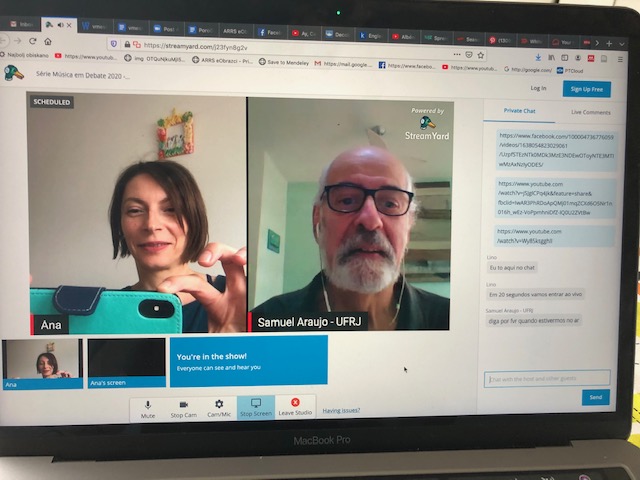Pavao Markovac was a musicologist, publicist, critic, political agitator, organizer, and a prominent member of the so-called Croatian left intelligentsia between the two World Wars. His extremely rich political and artistic work within the labor movement regularly, however, remained outside the narrow focus of scholarly debates. To illustrate, Nataša Leverić Špoljarić in the text “Pavao Markovac (1903–1941) – a musical enlightener between two world wars (on the 80th anniversary of his death)” (sic!) almost completely bypasses this part of his work, citing it only as a biographical episode, while other aspects of his work are elaborated in more detail. The reasons for omitting this key aspect still wait to be investigated, but it would not seem wrong to attribute them to historical revisionism, which casts a shadow on many fields and many depictions of left-wing artists and cultural workers of the interwar period. In different encyclopedic entries about Markovac there is only a remark that he wrote about music from a Marxist perspective, which does not show the width, complexity and intertwining of his journalistic, political and artistic work, based on the Marxist tradition. This text does not pretend to completely fill this gap, but to re-initiate the debate introduced by Markovac himself, which is, in short, on Marxist interpretations of music, its production, reception and, finally, it’s role in the society.
Preberi več “Domagoj Kučinić: Pavao Markovac in “delavska glasba”: ni za koncertne dvorane, ampak za srečanja in izlete”Project team at Loud Memories, Turbo Folks: Mapping Sound, Image and Remembrance in the Post-Yugoslav Space
Two days in mid-September, the 16 and the 17, were an opportunity to hear a number of excellent presentations by a diverse group of researchers at the Loud Memories, Turbo Folks: Mapping Sound, Image and Remembrance in the Post-Yugoslav Space International Symposium September.
The symposium, attended by our project team members, was driven by the desire to engage with the question how images, sounds, and memories (re)invent traditions, histories, and spaces of political intervention? The organisers, the Center for Cultural and Religious Studies, Faculty of Social Sciences, University of
Ljubljana (CPKR, FDV (UL)), and the MGLC – International Centre of Graphic Arts, forwarded the question of what are the cultural dynamics and the affective charges of the post-Yugoslav condition? How do they travel across various media and across the borders of various posttransitional peripheries?
Preberi več “Project team at Loud Memories, Turbo Folks: Mapping Sound, Image and Remembrance in the Post-Yugoslav Space”Tanja Petrović: Od hrupa do glasu Sonični afekt na delu med industrijskimi ruševinami (From Noise to Voice: The Work of Sonic Affect amid Industrial Debris)
On the website https://soundcloud.com/markotadik/sets/13-pieces-for-prvomajska one can listen to the sound installation by artists Marko Tadić and Miro Manojlović “Concrète machines: 13 pieces for Prvomajska”. These sound pieces have been used at the exhibition in the framework of The Second Biennale of Industrial Art in Istria under the title “On the Shoulders of Fallen Giants.” The installation was placed in the cinema hall in Raša, a small mining town, known as the youngest town in Istria: it was built in 1936 and 1937 to be home of miners and their families. The mines were closed only 30 years later, and the town is today just a monument to mining life and labor. The cinema hall also lost its function – its interior is emptied of seats and void of function. It is just one among many empty, ruining buildings in this town, built by Italians during their administration in Istria. The town that was carefully conceptualized to cater the needs of its inhabitants, for a long time already stands still, bond with the past, as a monument to a bygone era, and as a ruin of the imagination of the future that industrialization used to embody.
Prvi online seminar Musica em Debate: Ana Hofman in Samuel Araujo
Spletno diskusijo je gostil Samuel Araujo, organizirana pa je bila v sodelovanju več brazilskih etnomuzikoloških organizacij (Etnomuzikološki laboratori in skupina Musiculture – Tide, Laboratorij za etnomuzikologijo v sestavi študijske skupine za glasbo v Paráu, raziskovalne skupine za glasbo in identiteto v Amazoniji, oba iz UFPA in študijska skupina za glasbo v Amazoniji, iz UEPA).
Preberi več “Prvi online seminar Musica em Debate: Ana Hofman in Samuel Araujo”
Martin Pogačar: Futures of a clandestine recording: a song as a mnemotechnical device
A couple of years ago I was browsing YouTube videos when a video popped of a 1941 recording of an old Slovenian choir song Lipa zelenela je (“The linden tree grows green”). I knew the song only too well. It was a ubiquitous sonic feature of my growing up in the socialist Slovenia/Yugoslavia, part of choir repertoires, and a popular funeral song (as it is today). Hence it was generally disliked at the time by myself and my peers, and also became a matter of pop musical reinterpretations. Lačni Franz, for example, took the title and ironicised the funeral motive in his reinterpretation of the song. However, I hardly knew anything about the 1941 recording that, found on YT about 75 years later, shows two images, one of a map of occupied Slovenia during the Second World War (1941–1945) and another of Ljubljana under fascist occupation (1941–1943).
Lipa zelenela je. 1941 performance. Source.
Preberi več “Martin Pogačar: Futures of a clandestine recording: a song as a mnemotechnical device”
SIEF, delovna skupina BASE: Bodies, Affects, Senses and Emotions (telesa afekti, čuti in čustva)
SIEF, delovna skupina BASE: Bodies, Affects, Senses and Emotions (telesa afekti, čuti in čustva)
3. delavnica, Ljubljana, Slovenija, 4.–5. junij 2020
Lokacija: Znanstvenoraziskovalni center Slovenske Akademije znanosti in umetnosti
Rajko Muršič: Afektivne in politične razsežnosti jugoslovanske popularne glasbe, sklop predavanj, Bern 2019
V tednu med 14. in 16. 10. 2019 je Rajko Muršič izvedel kratek sklop predavanj na temo Afektivnih in političnih razsežnosti jugoslovanske popularne glasbe. Predavanja so potekala v okviru skupnega magistrskega študija iz socialne antropologije Creole/Kreol – Kulturna raznolikost in transnacionalni procesi na Inštitutu za socialno antropologijo Filozofsko-zgodovinopisne fakultete Univerze v Bernu (Universität Bern, Philosophisch-historische Fakultät, Institut für Socialanthropologie).
Ana Hofman, “Antifašizem, aktivizem in politike preteklosti po Jugoslaviji” predavanje na Univerzi Bucknell, Center za humanistiko, ZDA, 13. 11. 2019
Ana Hofman 13. novembra 2019 predavala na Centru za humanitiko Univerze Bucknell s temo “Antifašizem, aktivizem in politike preteklosti po Jugoslaviji”

XXXV. srečanje Evropskega seminarja etnomuzikologov “Uprizarjanje telesa” (“Performing Bodies”)
Projektna skupina se je udeležila XXXV srečanja Evropskega seminarja etnomuzikologov “Uprizarjanje telesa” (“Performing Bodies”), ki je potekalo v času od 3-7 September 2019, na Oddelku za glasbo, Durham University, UK.
Izledke svojih raziskav so predstavili na skupnem panelu “Sounds, Bodies and Affects in Music Performing and Listening,” ki ga je vodil Martin Stokes, Kings College London.
Okrogla miza »Sound survivals: affective structures of musical (self)care and solidarity across borders« na 45. konferenci ICTM (11.–17. julij 2019, Bangkok, Tajska)
This roundtable explored whether, when and how music and sound can contribute to practices of (self) care that oppose bodily and mental exhaustion, and structural feelings of social disintegration.
Sodelujoči: Marko Kölbl (University of Music and Performing Arts Vienna), Evrim Hikmet Öğüt (Mimar Sinan Fine Arts University), Ana Hofman (Slovenian Academy of Sciences and Arts), Tom Western (University of Oxford)


